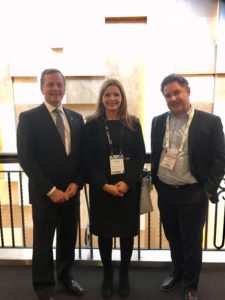Ontario Minister of Environment, Conservation and Parks Jeff Yurek provided a compelling keynote presentation on managing key waste streams at the Canadian Waste to Resource Conference on October 10, 2019. He emphasized the importance of improving initiatives to increase the recovery and diversion of organic and plastic waste.
“The way we address waste in Ontario no longer works,” said Yurek. “Unfortunately, despite our best efforts for the last 15 years, Ontario’s waste diversion rate has been stalled at about 30 per cent. And of that amount, up to 30 per cent of the material that is put in blue boxes ends up getting disposed of in landfills. It costs municipalities and taxpayers millions of dollars a year and those costs are expected to increase by approximately $10 million per year after 2019. It’s clear the Blue Box Program as it is now has become unsustainable.”
The minister pointed out missed economic opportunities to turn wastes into resources. According to the ministry’s estimates, for every 1,000 tonnes of waste diverted from landfill, there is an opportunity to generate:
- seven full-time jobs
- $360,000 in wages
- more than $700,000 in Gross Domestic Product.
“Ontario sends about 60 per cent of its food and organic waste to landfill, where it decomposes and emits methane,” said Yurek. “But this is a two-fold bad situation with food and organic waste using up valuable land resource in landfills and it negatively contributing to climate change. One thing we’ve seen over and over is that Ontarians want to see more action on organic waste at home, on the job and on the go.”
The ministry is taking a collaborative approach that’s drawing on the skills of industry experts, municipalities and non-governmental organizations. This summer the ministry established a working group to examine how to divert more food and organic waste and how to expand the green bin programs in Ontario.
Plastics pollution is another area of concern. Yurek expressed concern over the negative effects on communities and waterways and warned of the harmful impacts from micro plastics to freshwater systems. He said that approximately 10,000 tonnes of plastic waste is collected from each year from the Great Lakes.
“We are still working to tackle the problems from inconsistency in recovering and recycling plastic waste. We need a coordinated province-wide effort while ensuring Ontario businesses remain competitive. Through improved producer responsibility the onus will be on producers to manage plastic waste across the province,” said Yurek. “It’s a case for making environmental responsibility a matter of self-interest. It also makes sense because producers are the ones who are in the best position to manage how to find new ways to reduce the waste associated with their products.”
According to a government discussion paper released earlier this year, shifting the responsibility for the province’s Blue Box recycling program to producers would save municipalities more than $125 million annually.
Yurek is confident that an improved Blue Box recovery system, which will be decided by a wider variety of stakeholders, will help increase recyclable waste diversion. He said the transition will happen in phases starting in 2023 and be completed by 2025. The new program will encourage industry to change how it packages products to minimize waste and how to harmonize the 240 existing Blue Box programs to make the list of accepted materials that is more consistent across all communities.

Ontario Minister of Environment, Conservation and Parks Jeff Yurek, Environment Journal Editor Connie Vitello and OWMA Director of Policy and Communication Mike Chopowick.
The Waste to Resource conference, which was sponsored by the Ontario Waste Management Association, was hosted in partnership with the Waste & Recycling Expo Canada / Municipal Equipment Expo Canada held in Toronto on October 9 – 10, 2019. This year’s expo featured over 150 exhibitors, including manufacturers, service providers, associations and several industry experts. Supporters included some of North America’s leading industry associations, trade publications and online media. Attendees included visitors from across Canada, the United States, Europe and Asia.
The Ontario Waste Management Association (OWMA) also announced that Chief Executive Officer Rob Cook would be retiring after 19 years of service. He will be leaving in February 2020 and will be replaced by Mike Chopowick, who is currently the director of policy and communication for the OWMA.

Event Organizer Arnie Gess of Messe Frankfurt.
For further information about this event, click here
For further information about Ontario’s environment ministry programs, click here









